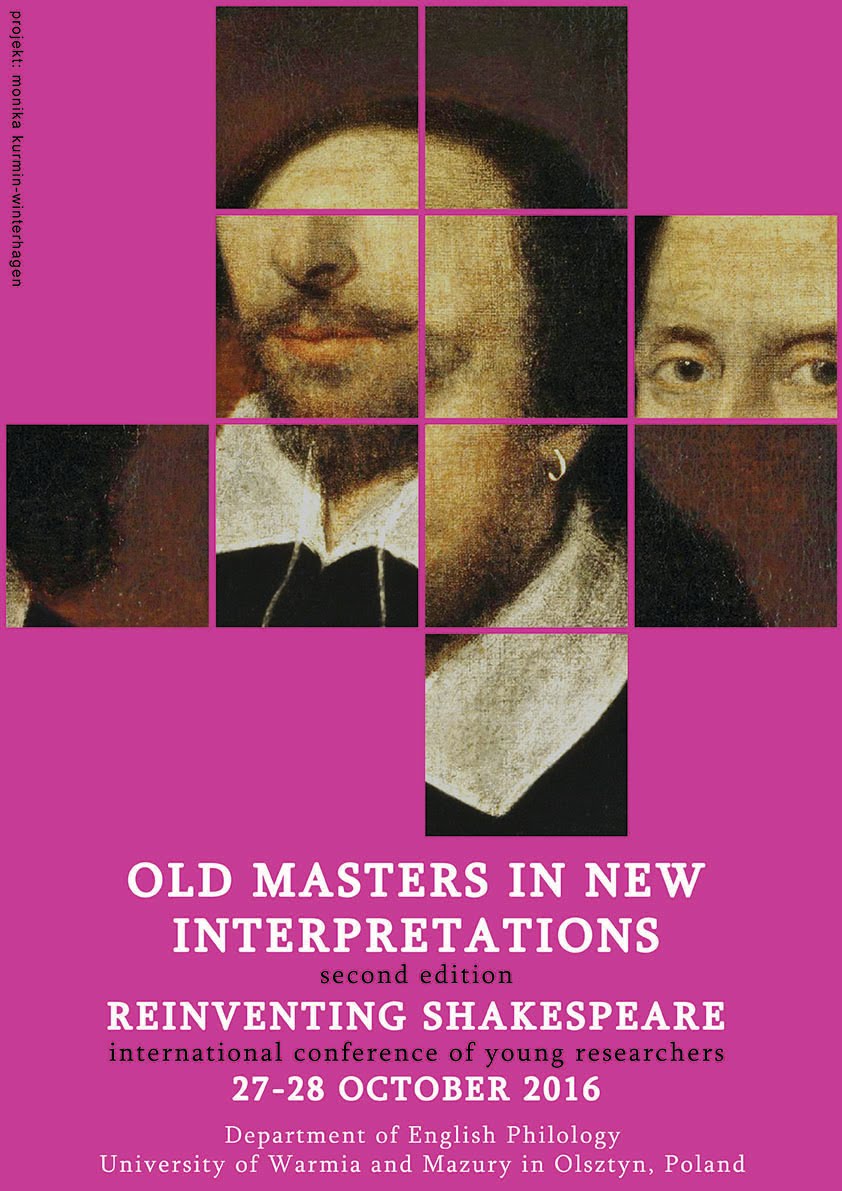wtorek, 21 czerwca 2016
niedziela, 13 marca 2016
Old Masters in New Interpretations
second edition
Rediscovering
Shakespeare
conference of young researchers
October 27-28, 2016
First Circular
Dear Colleagues and Students,
Following the successful outcome of the first edition of the “Old
Masters in New Interpretations” conference, we would like to announce the
second edition of this event. Therefore we are delighted to invite you to take
part in the conference of young researchers and their Masters, both in
literature and in life, to be held in the beautifully located town of Olsztyn,
Poland, 27-28 October 2016. This time, since the year obligates, it will be
devoted to various re-interpretations of one particular Old Master, i.e.
William Shakespeare.
KEYNOTE SPEAKERS
Prof. Jacek Fabiszak, Adam Mickiewicz University, Poznań, PL
Dr Karol Samsel, University of
Warsaw, PL
FIRST CIRCULAR AND CALL FOR PAPERS
In celebration of the 400th anniversary of the death of
William Shakespeare we would like to provide a space for academic discussion
for all interested in the influences of the playwright and his works on the
texts of culture that were created after Shakespeare. It is difficult to overemphasize
Shakespeare’s influence on many realms of art throughout the centuries. Since
his death in 1616, the poet and his works have been the subject of diverse
literary output and literary allusions as well as academic research in various
aspects and methodologies. The very first verses of praise that appeared as
early as the first part of the 17th century (poem "On Mr. Wm.
Shakespeare, he died in April 1616" by William Basse, written somewhere
between 1616 and 1623, or the famous Ben Jonson’s eulogy of 1623), sparked a
never-ceasing interest in Shakespeare and his works. From then on the poet
continuously inspires more and more generations of scholars, artists and
recipients of popular culture. The evidence of that may be found in the
popularity of the projects such as National
Theatre Live which enables the spectators around the world to rediscover
plays like Hamlet or As You Like It, or in the music
productions like album Ophelia by
Natalie Merchant to name but a few of
multiple creative initiatives carrying open or veiled references to
Shakespeare.
Thence, we are eager to know which of the features of Shakespeare’s
works are most appealing to the young
researchers of today and how he is perceived by them. We also warmly invite
more experienced scholars to take part in the conference to share their views
and expertise.
Consequently, we would like to confine the conference discussions to
both direct and indirect references to Shakespeare and his works. The following
aspects serve as an inspiration for the topics of papers. Please do not feel limited by them:
- Why is WH a
master?
- Direct and indirect references to WH in literature, theatre and
other media
- Translating WH
- WH and art
- How to teach
(about) WH?
- WH from various
perspectives (structuralism, new historicism, postcolonial criticism and
other)
- Speculation and
doubts about WH
- WH in pop
culture, parody, pastiche
- Shakespearian
themes and stylistics:
- Madness
- Illusory nature
of the world
- Protagonist
- Female
- Irony
- Politics and
power
- Love and
romance
You are very welcome to add more.
The language of the conference will be English. Papers are
scheduled to take 20 minutes, followed by a 10-minute discussion. We are also
prepared to organize a poster session. You are, therefore, welcome to submit
your poster proposals. The speakers are asked to submit abstracts of proposed
papers, not exceeding 150 words, by 24 June 2016, using the following
e-mail address: oldmasters2016@gmail.com
You will be notified of the acceptance/rejection of your submission by 30
June 2016.
The Conference
fee is 250 PLN/ $ 65 / € 60 and it covers the following:
conference materials
coffee breaks
two lunches
a
reception
reviews of the articles accepted for
publication
post-conference publication .
The fee should be paid by 1 September 2016. Details concerning
the bank account of the University of Warmia and Mazury in Olsztyn as well as
some useful information regarding the conference venue and accommodation will be provided in our next circular.
With best regards,
Conference
organizers
Anna Kwiatkowska, PhD
Eliza Gładkowska, MA
Dorota
Gładkowska, MAAnna Kwiatkowska, PhD
Eliza Gładkowska, MA
Subskrybuj:
Posty (Atom)
